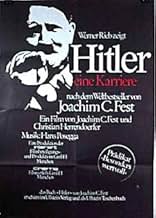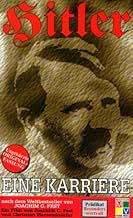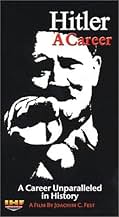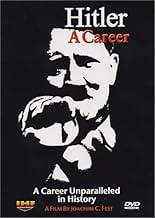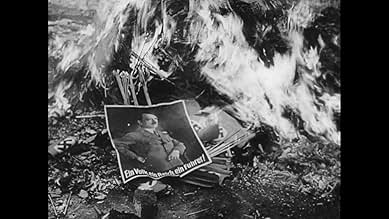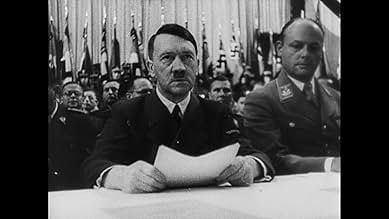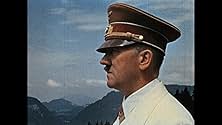This meticulously assembled film dissects the Third Reich with an analytical blade, charting Hitler's improbable rise, his mastery of crowd psychology and his consummate skill in exploiting ... Read allThis meticulously assembled film dissects the Third Reich with an analytical blade, charting Hitler's improbable rise, his mastery of crowd psychology and his consummate skill in exploiting others' weaknesses.This meticulously assembled film dissects the Third Reich with an analytical blade, charting Hitler's improbable rise, his mastery of crowd psychology and his consummate skill in exploiting others' weaknesses.
- Directors
- Writer
- Stars
- Narrator
- (German version)
- (voice)
- Self
- (archive footage)
- Self
- (archive footage)
- Self
- (archive footage)
- Self
- (archive footage)
- (as Dr. Karl Brandt)
- Self
- (archive footage)
- Self
- (archive footage)
- Self
- (archive footage)
- Self
- (archive footage)
- Self
- (archive footage)
- Self
- (archive footage)
- Self
- (archive footage)
- Self
- (archive footage)
- Self
- (archive footage)
- Self
- (archive footage)
- Self
- (archive footage)
- Directors
- Writer
- All cast & crew
- Production, box office & more at IMDbPro
Featured reviews
But this was made in 1977 and it's 150 minutes of archival footage about hitler and his germany. No talking heads though there is of course a narrator to describe what we are looking at. Many many scenes of Hitler giving actual speeches. He speaks in german but there are subtitles. It's really cool to watch and hear this outrageous figure from the past.
It's probably still the most abundant treasure chest of film and image about the dictator available. We have no talking experts and none of the glossy, samey feel of Netflix documentaries. It's German made and narrated by a Brit - so Hitler is, of course, savaged, often with sardonic wit. The tone is hypnotic.
The biggest sense it covneys is of Hitler as both director of theater and actor on a stage he prepares. In a few marvelous, and previously unseen by me footage, we see not just the vitriolic exposition up on stage - but also the nervous preparation, the uncertainty of the early days. And when deprived of the spotlight, having to sit with others as a more ordinary mortal (such as at Berghof), morose, taciturn, uninteresting.
FDR was a huge contrast. Similarly magnetic when he wanted to, inspiring on a stage, but happier outside of it, gregarious with company and loved a good gossip. He did entertain his own coterie like Hitler, but his home was vivacious, open-hearted.
It paints a good picture of early Hitler in Vienna growing quietly resentful at being ordinary. In a Travis Bickle or Lee Oswald kind of way.
The need was always for a grandiose stage and adulation from a crowd. In later days, confused by unexpected successes (invading through the Ardennes), he thought he was also a strategic genius, to disastrous results for everyone.
His bitterest legacy, the Holocaust, is included near the end, with harrowing footage. WWII footage will be more familiar from other places, by comparison to the early days. And how fitting that post Stalingrad at the latest, there are no more foootage of speeches and crowds and only the well known Hitler who looks shaken and glum.
There are so many riches here; we don't just see Hitler driving triumphant into Vienna for the Anschluss, we also see the speech before an endless crowd welcoming his home country Austria into the empire. Footage from the Blitz we have seen countless times; but I've never before seen footage of German parades in the closing stages of the war, trying to recapture the fervor of early Nazi days but looking ramshackle and foolish amid ruins of a half-destroyed city.
So this is essential viewing to this day, more so for the prewar coverage. WWII changed everything in ways we still do not fully grasp - our world was sped up by maybe 100 years I think. We are picking its lessons apart at our peril. One of the best I've seen.
More importantly, key messages are quoted so that Hitler's program of ending democracy from within is laid bare. (In one speech to workers, Hitler acknowledges that many in his audience might begrudge his having outlawed the Marxist Party, but he maintains that this was compensated for by the fact that he had outlawed all the other parties, too.) The point that Hitler was twice banned from public speaking for lengthy periods of silence is stressed; a fact more often overlooked by similar docs (and by those who think that banning free speech is an effective weapon against extremism).
The Nazi's welfare programs, including soup kitchens and giveaways, are brought up, and a nod is made to the fact that planning for some of the public works projects, such as the Autobahn, although realized under him, preceded Hitler's rule. (No mention is made, however, of how frequently the Hitler government ran roughshod over people's land rights to build this superhighway.)
Many steps taken by the Nazis and many obstacles placed in Hitler's path get more of a mention here than they do in other docs of this type, but these steps are not always emphasized enough, nor kept in chronological order. Indeed, these obstacles are very apt to be mentioned out of chronological order, thereby under-emphasizing their potential significance. Alfred Hugenberg's objection to Hitler's appointment as chancellor is mentioned only after Hitler becomes chancellor, noting that it was "too late" to stop him. This doc makes a habit of mentioning many things when it is too late to register that these were, indeed, obstacles. Franz von Papen's well-received 1934 speech is not in this doc at all, even though it represented virtually the last time anyone in a position of authority criticized the changes brought about by Hitler; it was also too late but deserves to be mentioned. (Within a few months, the Nazis had put Papen under house arrest and murdered his speechwriter.)
The exploitation of young people and their unformed enthusiasm is mentioned only after the Nazis had gained power. This ignores the fact that all political parties-including the Communists as well as the Nazis-had been courting youth since the 1920s. Communist youth groups and Nazi ones had long vied to recruit young people. In connection with recruitment, the doc does not mention the Nazi program to recruit members from the Marxist groups. It says that when Joseph Goebbels became party leader of Berlin in 1926, he targeted Communists, but not only to fight against them in the streets. He also seduced many of them into switching sides, a program that Hitler himself heartily approved. This is not mentioned by this doc.
Other documentaries I have seen do a better job of covering all of the factions within the Nazi Party. This one only focuses on the biggest challenge from Ernst Rohm, the unruly leader of the Storm Troopers (SA), who along with other SA leaders was murdered early in the summer of 1934. (See "Hitler's Circle of Evil" for a better account of some of Hitler's other rivals within the Nazi Party.) Again, developments are not in order here; after Hindenburg died in August 1934 (You will notice how many major developments occurred in 1934!), yes, Hitler got the full support of the German military, but this was only the outward result of secret deal-making that had been ongoing since early that year when the Army agreed to support Hitler if he prevented Rohm from expanding the SA. It was the twin demises of Rohm and Hindenburg within weeks of each other that sealed a deal that had already been made.
Unfortunately, this doc, like several others I have seen, muddles its discussion of the crucial presidential campaign of 1932. It obscures the fact that the office that Hitler ran for was president of Germany and that he finally became a German citizen only this late in his career so that he could qualify to run for office. (How often this remarkable fact is not covered by documentaries about Hitler and the Nazis!) More importantly, while it does make the point that the Nazis made their best showing yet in the parliamentary elections even if they did not win a majority, it does not tell us that Hitler lost the presidential election to the incumbent chief executive, General Field Marshal Paul von Hindenburg. Hitler subsequently became chancellor at the end of January 1933, yes, through appointment by Hindenburg, a fact that is revealed in this doc. The viewer should be excused if confused because this doc does not mention the fact that Hitler lost the April 1932 election (or that it happened in 1932 and not in 1933-the doc mentions the 1932 election results only after discussing events of early 1933). It is rarely mentioned by any of these docs that Hitler never won a national election where there were other candidates on the ballot.
You can learn a lot from this doc, but you will be misled if you rely on it exclusively for the facts.
Did you know
- Quotes
Narrator of English version: Any man who put his trust in Hitler, could count on his protection. The frightened middle classes, the working man, or the unemployed. His energetic platitudes were directed at everybody.
- ConnectionsFeatures Le triomphe de la volonté (1935)
- How long is Hitler: A Career?Powered by Alexa
Details
- Release date
- Country of origin
- Language
- Also known as
- L'aigle avait deux têtes
- Filming locations
- Berlin, Germany(Historical Footage)
- Production companies
- See more company credits at IMDbPro
- Runtime2 hours 30 minutes
- Color
- Sound mix
- Aspect ratio
- 1.37 : 1



